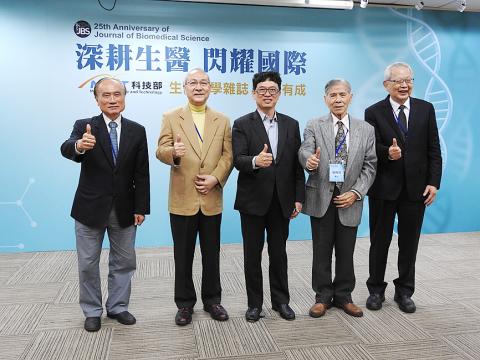Research and experimental medicine papers from Taiwan’s first English-language journal for biomedicine last year ranked as the most influential in Asia, the Ministry of Science and Technology said yesterday as the journal marks its 25th anniversary.
The ministry celebrated the anniversary of the Journal of Biomedical Science at a news conference in Taipei, which was attended by the journal’s current and former editors-in-chief.
The journal, launched by the ministry in January 1994, is the first international journal in biomedical science operated by a Taiwanese team, Deputy Minister of Science and Technology Shieh Dar-bin (謝達斌) said.

Photo courtesy of the Ministry of Science and Technology
Its impact factor, which reflects the yearly average number of citations its published articles received, rose from 0.99 in 1999 to 5.203 last year, Shieh said, citing information in the Journal Citation Reports (JCR) database released by the US Institute for Scientific Information earlier this year.
When the Journal of Biomedical Science first started publishing, only about three in every 100 submissions by Taiwanese researchers were accepted by international journals, said Chang Chuan-chiung (張傳炯), the journal’s founding editor-in-chief and Academia Sinica academician renowned for his research on snake venoms.
In research and experimental medicine, JCR ranked the Journal of Biomedical Science as No. 1 among 19 similar publications in Asia and 20th of 136 similar journals worldwide last year, said Chang Wen-chang (張文昌), its current editor-in-chief and chairman of Taipei Medical University’s board of trustees.
In cell biology, the journal was ranked fourth among 18 similar publications in Asia and 49th among 193 similar publications worldwide, he said, adding that the field is more competitive for studies involving both animal and plant cells.
The key to improving the Journal of Biomedical Science’s clout is to publish special issues on “trending topics” or subjects showcasing Taiwan’s research edge, such as enterovirus 71, dengue fever, hepatitis B, immunotherapy and neurodegenerative diseases, Chang Wen-chang said.
Over the past five years, the Journal of Biomedical Science had received 24 percent of submissions from China, 12 percent from India, 8 percent from Taiwan and 3 percent from the US, he said, adding that quality, not nationality, is the primary consideration for publication.
The journal is published by UK-based BioMed Central, part of global publisher Springer Nature, which helps it reach more readers in the US and Europe, he said.

EVA Airways today confirmed the death of a flight attendant on Saturday upon their return to Taiwan and said an internal investigation has been launched, as criticism mounted over a social media post accusing the airline of failing to offer sufficient employee protections. According to the post, the flight attendant complained of feeling sick on board a flight, but was unable to take sick leave or access medical care. The crew member allegedly did not receive assistance from the chief purser, who failed to heed their requests for medical attention or call an ambulance once the flight landed, the post said. As sick

A drunk woman was sexually assaulted inside a crowded concourse of Taipei Railway Station on Thursday last week before a foreign tourist notified police, leading to calls for better education on bystander intervention and review of security infrastructure. The man, surnamed Chiu (邱), was taken into custody on charges of sexual assault, taking advantage of the woman’s condition and public indecency. Police discovered that Chiu was a fugitive with prior convictions for vehicle theft. He has been taken into custody and is to complete his unserved six-month sentence, police said. On Thursday last week, Chiu was seen wearing a white

EVA Airways, one of the leading international carriers in Taiwan, yesterday said that it was investigating reports that a cabin crew manager had ignored the condition of a sick flight attendant, who died on Saturday. The airline made the statement in response to a post circulating on social media that said that the flight attendant on an outbound flight was feeling sick and notified the cabin crew manager. Although the flight attendant grew increasingly ill on the return flight, the manager did not contact Medlink — a system that connects the aircraft to doctors on the ground for treatment advice during medical

The Taichung District Court yesterday confirmed its final ruling that the marriage between teenage heir Lai (賴) and a man surnamed Hsia (夏) was legally invalid, preventing Hsia from inheriting Lai’s NT$500 million (US$16.37 million) estate. The court confirmed that Hsia chose not to appeal the civil judgement after the court handed down its ruling in June, making the decision final. In the June ruling, the court said that Lai, 18, and Hsia, 26, showed “no mutual admiration before the marriage” and that their interactions were “distant and unfamiliar.” The judge concluded that the couple lacked the “true intention of